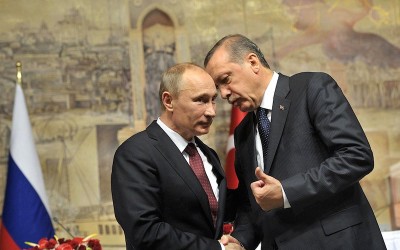Erdogan’s Outburst Against Russia Reveals Frustration

Back in November 2015, a Turkish F-16 fighter jet shot down a Russian Sukhoi Su-24M near the Syria–Turkey border on the allegations that the Russian warplane had violated Turkish airspace for 17 seconds – an interesting casus belli considering that Turkey violates Greek airspace thousands of times a year, occupies large swathes of northern Syria in defiance of international law, and continues to rebel against United Nations resolutions by illegally occupying northern Cyprus. Russian President Vladimir Putin in December 2015 promised Turkey they “will regret” being responsible for the death of Russian pilots. Although rumors circulated of a first Russo-Turkish War since World War I, the only reaction Russia made against Turkey were sanctions.
But rather than a deterioration of relations, the exact opposite has happened with an acceleration of bilateral relations, so much so that Turkey even acquired the lucrative Russian-made S-400 missile defense system, in addition to the two countries opening the Turkstream pipeline earlier this month and cooperating on Syria through the Astana and Sochi formats. It appears that the “regret” Putin would inflict on Turkey has not even remotely come to fruition and rather Turkish President Recep Tayyip Erdoğan has been rewarded for his insolence, especially as there has been at least 116 Russian military deaths, most of them killed by Turkish-backed terrorists groups in Syria.
Putin has caused havoc in NATO by giving Turkey the confidence to act in its own interests, despite Erdoğan’s own imperial ambitions. This sense of self-confidence in Turkey has allowed the country to pursue its Neo-Ottoman dreams that has antagonized all of its neighbors, the European Union, NATO and all regional states with the exception of Qatar, which unironically was one of the last countries to get independence from the Ottoman Empire. By instilling a self-confidence in Turkey, a confidence that pushes for an ambition it cannot meet, Putin turned Erdoğan into an ally and a friend. However, when we look at the long game that Putin has played, Russia has been using Turkey for its own interests.
Turkey’s Libya gambit has once again shown that it is isolated, finding no support from any interested party in the conflict. At a time when Turkey is becoming increasingly isolated but still confident in its relations with Russia, Moscow condemned Turkey’s decision to increase its military assistance to the Tripoli government.
Despite the increasing isolation and memories of the crippling Russian sanctions on Turkey in 2015, Erdoğan appears to be frustrated and lashed out against Moscow yesterday saying:
“Currently, Russia is not abiding by Astana or Sochi [peace formats on Syria]. If we are loyal partners with Russia on this, they have to put forth their stance… Our wish is that Russia immediately makes the necessary warnings to the [Syrian] regime which it sees as a friend. The Astana process has fallen into silence now. We need to look at what Turkey, Russia and Iran can do to revive the Astana process.”
It certainly cannot be denied that Erdoğan is frustrated and is now falsely claiming that Russia is not adhering to the deals made in Astana and Sochi. The deals allow for the Syrian government and its allies to conduct operations against terrorist organizations, such as the Al-Qaeda affiliated Al-Nusra Front and the Turkestan Islamic Party, with the former being the most dominant and powerful militant group in the Syrian province of Idlib.
Russia’s assistance in fighting Al-Qaeda in Idlib prompted Erdogan’s outburst, where he also said “Russia tells us they fight against terrorism. Who are terrorists? The people fighting to defend their own lands?” This once again shows Turkey’s complete defense and apology for terrorist organization operating in Syria, unsurprising since it was Russia who revealed and destroyed the lucrative ISIS-Turkey oil trade in 2015 with surgical airstrikes against convoys that were ignored by the U.S. air force. So not only has Turkey revealed its frustrations against Russia for its own failures in Libya and Syria, it is now reverting to lies and contradictions that it usually reserves for using against Greece, Cyprus, Syria and Armenia, by deceitfully claiming Russia is “not abiding by Astana or Sochi.”
With increasing of anti-Turkish sentiment in Washington, Europe and the wider region Turkey has become militarily, diplomatically and economically weaker, as well as completely isolated – effectively destroying all ambitions for a Neo-Ottoman Empire.
*
Note to readers: please click the share buttons above or below. Forward this article to your email lists. Crosspost on your blog site, internet forums. etc.
This article was originally published on InfoBrics.
Paul Antonopoulos is a Research Fellow at the Center for Syncretic Studies.
Featured image is from RIA Novosti

